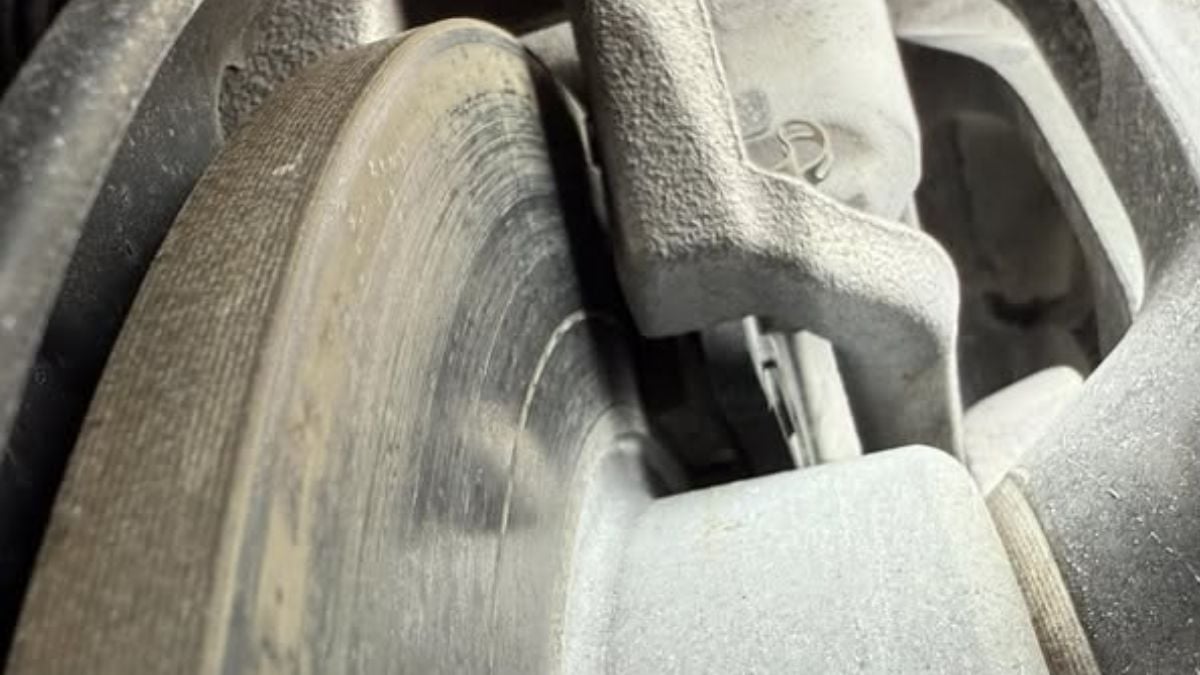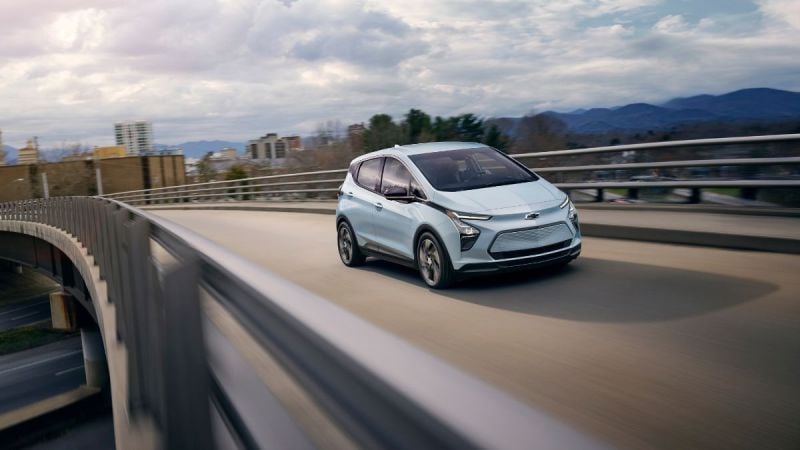Owning an electric vehicle (EV) often comes with some unique expectations, particularly when it comes to maintenance and the wear and tear on certain parts. One of the biggest advantages of driving an EV like the Chevy Bolt is how little maintenance it requires compared to traditional gasoline-powered cars. No oil changes, fewer moving parts, and a regenerative braking system that reduces the need to rely on traditional mechanical brakes are just a few reasons why the Chevy Bolt has made waves in the EV market. But what about the brakes? How well do they hold up as you rack up the miles?
I recently came across an interesting post in the Chevy Bolt EV and EUV Owners Group on Facebook by Drew Donato, who has put an impressive 35,000 miles on his 2022 Chevy Bolt EV. Drew shared how his brake pads are still in great shape, even though he’s been using them more frequently lately due to the icy and snowy conditions in his area. "I have 35,000 miles on my brake pads in my 2022 Bolt EV, and they’re still in good shape," Drew wrote. "I’ve been using them a bit more lately due to snowy roads and ice. How is everyone else’s doing, and what’s the most miles you’ve gotten out of them?"

His post sparked an interesting conversation about brake pad longevity among Chevy Bolt owners, and it’s clear that different factors like driving conditions and maintenance habits play a role in how well these brake pads hold up over time.
The Chevy Bolt's Brake System: A Closer Look
Before diving into other owner experiences, it’s essential to understand the technology behind the Chevy Bolt’s braking system. Like most modern EVs, the Chevy Bolt uses a regenerative braking system, which helps to recover energy during braking and send it back to the battery. This system not only improves efficiency but also reduces the overall wear on traditional brake pads. Regenerative braking can slow the car down without engaging the mechanical brakes, which is especially useful in stop-and-go traffic or city driving.
However, there are still situations where you’ll need to use the mechanical brakes. For example, on snowy or icy roads like Drew mentioned, or when you need to come to a quick stop. This is where the longevity of your brake pads becomes a real point of interest for EV owners.
If you want to know more about how the Chevy Bolt compares to other EVs, you can read more about it in our article on How the Chevy Bolt EV Still Outshines Its Rivals. This piece dives deeper into the Bolt’s performance and why it remains a top choice for many EV enthusiasts.
The Owner Feedback: How Long Do the Brakes Last?
As expected, Drew's post about his brake pads' performance caught the attention of other Chevy Bolt owners, who were eager to share their own experiences. Here's a look at some of the insights they provided.
Abraham Bartlett, who drives a 2023 Chevy Bolt EUV, chimed in with his experience. He mentioned that while his brakes had lasted for around 32,000 miles, they had started making a grinding noise. "The brakes have been making a grinding noise occasionally," Abraham said. "It fades away but comes back, and it’s noticeable when it does. I’m hoping it’s just the salty weather here in Michigan, but I’ll probably take it in before the 36,000-mile bumper-to-bumper warranty ends." Abraham's situation highlights an important consideration for EV owners in areas where road salt is used frequently in winter months. Salt can accelerate corrosion, potentially affecting the brake components even if the mechanical brakes aren’t used much.
For those wondering about the overall reliability of the Chevy Bolt EV, our in-depth Chevy Bolt EV Buying Guide is an excellent resource to help you make an informed decision.
Micheal Rudy, another member of the group, shared a different issue he encountered. He had to replace his rear brake pads and rotors after they became stuck, leading to excessive wear. "I had to replace my rear pads and rotors because they were stuck, and the pads wore through," Micheal explained. "I think the answer to this question depends a lot on whether the car is often driven in areas where salt is used on the roads. While you wouldn't expect the brakes to wear out due to normal use, they can corrode and need replacement." Micheal’s story reinforces the idea that environmental factors, like exposure to salt and moisture, can play a significant role in the lifespan of the brake system.
In fact, if you’re curious about how the Bolt handles long-term battery health after 100,000 miles, our article on Chevy Bolt EV Battery Health After 100,000 Miles will give you a good look at the longevity of key components over time.
On the other hand, Jean Des Rosiers shared a perspective focused on the importance of using the mechanical brakes regularly, even in an EV. "It’s more a matter of time than distance," Jean said. "My first set of brakes were destroyed in less than 3 years or 30,000 km! Now, with about the same distance and time, they are like new. I recommend using the brakes at least once a day by putting the car in neutral and pushing hard on the pedal. After that, switch to one-pedal driving." Jean's suggestion emphasizes that, while regenerative braking is efficient, it's still important to exercise the mechanical brakes occasionally to keep them in good condition.
Eric Bergstrom, another experienced owner, offered practical advice for maintaining brake health. "I make it a point to use the mechanical brakes, especially after driving through the rain," Eric said. "I put the car in neutral on the way to a stop sign and then use the mechanical brakes. I verify that even the rear brakes are applied by feeling the rotor in the back to check if it's warm. This way, the rotor heat dries them out and also exercises the pistons in the caliper." Eric’s technique of actively using the mechanical brakes ensures they don’t seize up, which is especially important in wet conditions where corrosion can be a concern.
The Impact of Driving Conditions
One common thread in all of these stories is the impact of driving conditions on brake longevity. Regions that experience harsh winters with salt-treated roads or wet climates will likely see more wear on their brake pads due to corrosion. Similarly, drivers who rely heavily on regenerative braking might experience longer brake pad lifespans, as the mechanical brakes are engaged less frequently.
If you live in an area with mild weather and don’t drive in conditions where you need to use the mechanical brakes often, your brake pads might last much longer. However, if you frequently drive in areas with salt, rain, or icy conditions, you might need to keep a closer eye on your brake components, as these can shorten the lifespan of the brake system. As seen in the experiences of Drew, Abraham, Micheal, Jean, and Eric, there’s no one-size-fits-all answer when it comes to brake pad longevity.
If you’re considering an EV but still wondering how it holds up against rivals, be sure to check out our detailed comparison in the Chevy Bolt vs. Chevy Volt article, where we break down everything you need to know.
Taking Care of Your Chevy Bolt’s Brakes
To ensure that your brake pads last as long as possible, regular maintenance and proper driving habits are key. While regenerative braking reduces the need for frequent use of the mechanical brakes, you still want to keep them in good working order. Here are a few tips for keeping your brakes in top shape:
-
Use the mechanical brakes occasionally: If you drive in wet conditions or on salty roads, make sure to use the mechanical brakes from time to time. This helps to prevent corrosion and ensures that the brake components remain functional.
-
Check for unusual noises: If you start to hear grinding or squealing noises from your brakes, it could be a sign that your brake pads are worn down or there’s an issue with the brake system. Don’t ignore it, schedule an inspection.
-
Monitor brake fluid levels: Brake fluid is essential for the performance of your mechanical brakes. If the fluid levels are low, it could indicate a leak or another problem.
-
Drive mindfully: Avoid aggressive braking, especially on icy or snowy roads. Smooth and gradual braking not only improves safety but also extends the life of your brake pads.
The Bottom Line: What’s the Lesson?
As more people adopt EVs like the Chevy Bolt, it’s important to remember that proper maintenance still plays a role in keeping your vehicle running smoothly. The longevity of brake pads can vary depending on factors like driving conditions, how often you use the mechanical brakes, and even regional weather. The good news is that with the proper care, you can expect your Chevy Bolt’s brakes to last for a long time, even in challenging conditions.
In the end, one key takeaway is that being proactive about your car’s maintenance, even with an EV, will save you time, money, and potential headaches down the road. It’s all about striking the right balance between relying on regenerative braking and giving your mechanical brakes some attention.
And if you’re considering buying an EV, be sure to check out our detailed Chevy Bolt EV Buying Guide to help you make the best choice for your needs. You can also explore the Chevy Bolt's performance and find out why the Chevy Bolt still stands out among other EVs in the market.
Now, I want to hear from you, our readers. What has been your experience with brake pad longevity in your Chevy Bolt or other EV? Have you had any issues, or are your brakes still going strong after several thousand miles? Please share your thoughts and experiences in the comments below.
Narek Hareyan is a young automotive journalist with experience in a golf cart dealership and an interest in the automotive industry. Follow Narek on X for daily news coverage about cars.
Set Torque News as Preferred Source on Google












Comments
Almost no wear on mine. I…
Permalink
Almost no wear on mine. I live in a mild climate with no salt on the roads, so I expect that the brakes will last the car’s lifetime.
My GMC 3/4 ton had 120000…
Permalink
My GMC 3/4 ton had 120000 miles on the pads and I replaced them because they were old not worn.
If the brake pads need…
Permalink
If the brake pads need inspection after 35,000 miles, something is seriously wrong with the design. Brake pads on an EV should be able to go ten times that distance before they'd be checked for wear, and they still might have most of their life left. If you ever got to the point where the wear indicators touched the rotors, you'd have years before you'd need to replace the pads, except for the noise from the indicators.
I have a 2020 Bolt with 33k…
Permalink
In reply to If the brake pads need… by Haggy (not verified)
I have a 2020 Bolt with 33k miles, my brakes and rotors look brand new still, I expect them to last 100k, if your brakes are going bad that fast on one pedal driving then you're just a horrible driver LOL
2011 Chevy Volt, 220,000…
Permalink
2011 Chevy Volt, 220,000 plus miles with original brake pads; replaced brake valve module at 218K
There's something wrong with…
Permalink
There's something wrong with the Bolt brakes if they wear out in 30K miles. I've had a Prius go 90K miles before replacing rotors and pads. Probably could have gone 100,000 miles. All the other hardware was in good shape after 10-11 years on Michigan roads. Regenerative braking really helps keep brakes "new".
After reading this article…
Permalink
After reading this article about Chey Bolt brake pads I felt the urge to chime in. My wife and I have a 2017 Bolt with 107k miles and we have not spent a penny on the brake pads or any other maintenance other than a new set of tires when the car had ~ 55k on them. The brake pads looked like they were brand new at ~ 50k miles and we just had them looked at again at 107k miles. The front brake pads still look great but the rear brake pads were rated at level 3 and will need to be replaced soon, as well as the drums. I still can't believe how little maintenance our Bolt has needed and if you are conservative to moderate driver you should have brake pads that last for long time (minimum 50k+ miles). We live in NJ and I commute 30 miles each way to work on a pretty busy road (Rt.10) so salt, traffic and a lot of lights should require a lot of maintenance but 8 years with our Bolt has been awesome :-)!